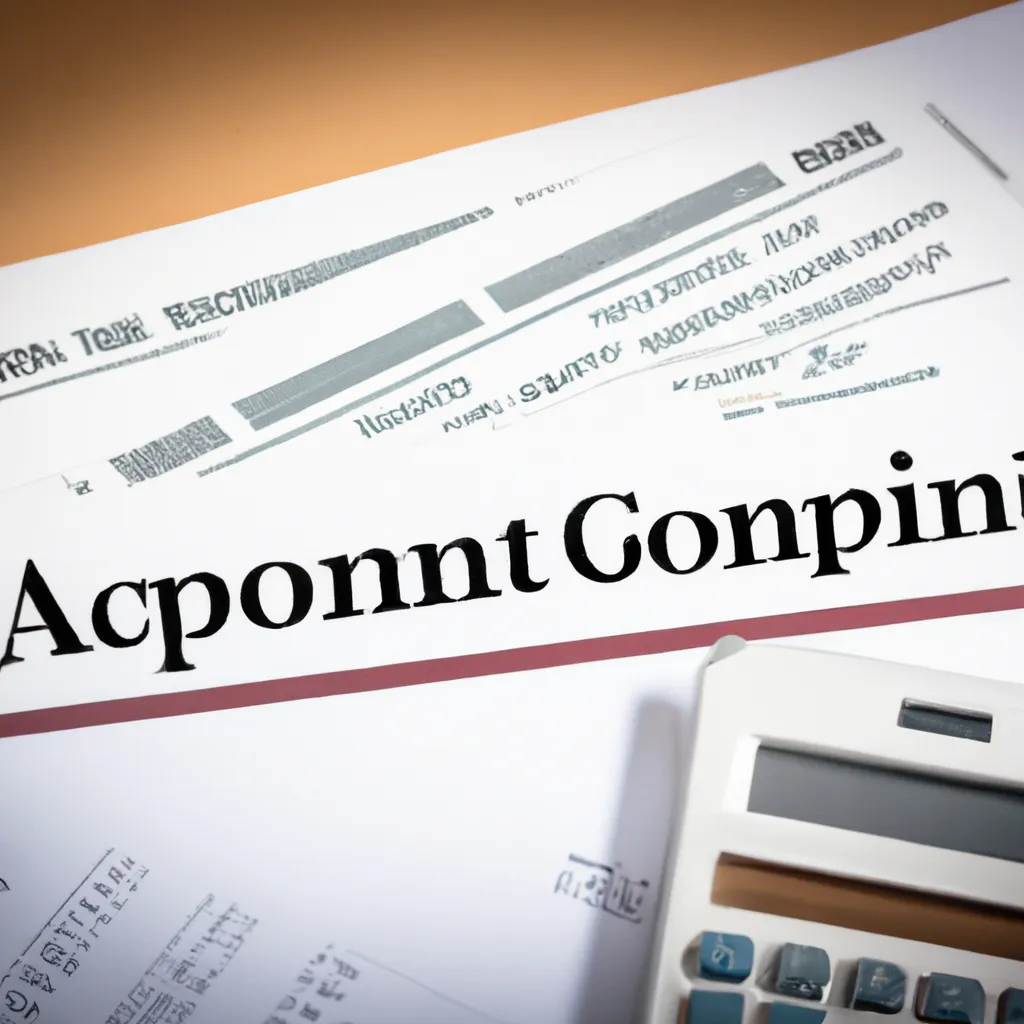Maximizing Appreciation in Winnipeg: Unlocking the Benefits of Your Accounting Period Have you ever wondered how you can make the most out of your accounting period in Winnipeg. Are you looking for ways to maximize your appreciation and unlock the full potential of your financial statements. Look no further, because in this article, we will be sharing tips and strategies on how you can make the most out of your accounting period in the bustling city of Winnipeg. In just a few paragraphs, you will learn valuable insights from industry experts and discover the best practices for optimizing your accounting period.
By the end of this article, you will have a better understanding of how to utilize your financial statements to their fullest potential and reap the benefits of a well-managed accounting period in Winnipeg. Join us as we dive into the world of accounting and uncover the secrets to maximizing your appreciation in Winnipeg. With the help of experienced professionals and practical strategies, you'll be able to unlock the benefits of your accounting period and take your financial management skills to the next level. Get ready to elevate your understanding of accounting and achieve financial success in Winnipeg.

Understanding the importance of your accounting period
The accounting period is a crucial aspect of financial management for businesses in winnipeg and all around the world. It serves as the foundation for managing a company's finances and plays a significant role in determining its overall success. While some may view the accounting period as simply a necessity for tax purposes, it is much more than that. In this article, we will explore the importance of your accounting period and the benefits of having a well-managed one for your business.
The foundation for financial management
The accounting period refers to the time frame in which a company's financial transactions are recorded, summarized, and reported. It is typically one year, but can also be a shorter or longer period, depending on the company's accounting policies. This period is crucial because it allows businesses to track their financial performance over a set amount of time. Without a defined accounting period, it would be incredibly challenging to understand a company's financial health and make informed decisions.
By having a clear accounting period, businesses can accurately track their revenue, expenses, and profit over time. This information is crucial for financial planning, budgeting, and developing strategies for future growth. It also allows businesses to identify any financial issues or discrepancies and take corrective measures promptly.
The benefits of a well-managed accounting period
Having a well-managed accounting period offers several benefits to businesses of all sizes. Let's take a closer look at some of the key advantages:
- accurate tax reporting: One of the primary purposes of an accounting period is to record and report a company's financial transactions for tax purposes. By having a well-managed accounting period, businesses can ensure that their tax returns are accurate and complete. This helps avoid any potential penalties or legal issues.
- better financial decision-making: As mentioned earlier, the accounting period provides a clear understanding of a company's financial performance. By having this information, businesses can make informed decisions about investments, spending, and other financial matters. This allows them to allocate their resources effectively and drive growth.
- improve business performance: A well-managed accounting period allows businesses to track their progress and measure their performance against set goals. By identifying areas of improvement, they can make strategic changes to improve efficiency, reduce costs, and ultimately increase profits.
- easier auditing: An accounting period provides an organized structure for financial records, making it easier for businesses to undergo audits. This is especially beneficial for larger businesses that may have a higher volume of financial transactions that need to be reviewed.
The impact on business success
The success of a business is highly dependent on its financial management, making the accounting period a critical factor. An optimal accounting period can have a significant impact on a company's overall success in several ways:
- increased revenue: With a well-managed accounting period, businesses can identify and capitalize on profitable opportunities. This, combined with accurate financial reporting, can help increase revenue and contribute to business success.
- efficient operations: By having a clear understanding of their financial performance, businesses can make more informed decisions about operations. This includes identifying areas for cost-saving, streamlining processes, and optimizing resources.
- competitive advantage: With accurate and timely financial reporting, businesses can stay ahead of their competitors. This allows them to make strategic decisions and adapt to changes in the market, giving them a competitive advantage.
- better planning: A well-managed accounting period enables businesses to develop long-term financial plans and set realistic goals for growth. This can contribute to the overall success of a company by providing a clear roadmap for achieving its objectives.
The accounting period is a vital aspect of financial management for businesses in winnipeg and beyond. It serves as the foundation for financial reporting, decision-making, and business success. By having a well-managed accounting period, companies can reap the benefits of accurate financial reporting, improved operations, and a competitive advantage. It is essential for businesses to understand the significance of their accounting period and ensure that it is well-managed for continued success.

The intricacies of inheritance tax in winnipeg
When it comes to inheritance, most people focus on the emotional and familial aspects, rather than the financial implications. However, the reality is that there are financial considerations that must be addressed, especially when it comes to inheritance tax. In winnipeg, the rules and regulations surrounding inheritance tax can be quite complex, and it is crucial to understand them to avoid any potential financial surprises in the future.
Gain insight into the complexities of inheritance tax in winnipeg
Inheritance tax, also known as estate tax or death tax, is a tax that is imposed on the transfer of property or assets from a deceased person to their heirs. In winnipeg, inheritance tax is governed by both provincial and federal laws, making it particularly intricate to navigate. The amount of inheritance tax owed is based on the total value of the deceased person's estate and can vary depending on various factors, including the relationship between the deceased and the beneficiary, the size of the estate, and the types of assets that were inherited.
One of the primary complexities of inheritance tax in winnipeg is the different tax rates for different types of inheritances. For example, if the beneficiary of an inheritance is a spouse, there is no inheritance tax imposed. However, if the beneficiary is a non-spousal relative, such as a child, the inheritance tax rate can be as high as 40%. Furthermore, certain assets, such as registered retirement savings plans (rrsps) and tax-free savings accounts (tfsa), are tax-exempt and are not subject to inheritance tax.
Discover strategies to minimize the impact of inheritance tax on your finances
With the potential for high tax rates, it is crucial for individuals to plan accordingly to minimize the impact of inheritance tax on their finances. One of the most effective strategies is proper estate planning. This includes creating a will, utilizing trusts, and gifting assets before death – all of which can help reduce the overall value of an individual's estate and, therefore, the amount of inheritance tax owed.
Another strategy is to take advantage of tax deductions and credits available for inheritance tax. For example, there are deductions for charitable donations made through an individual's will, resulting in a lower tax bill for their estate. It is essential to consult with a tax professional to determine the best course of action and strategies that are applicable to each individual's unique situation.
Learn how inheritance tax can affect your accounting period and bottom line
As mentioned earlier, inheritance tax is a complex issue that involves both provincial and federal laws. This also means that it can have a significant impact on an individual's accounting period and bottom line. For instance, if an individual inherits assets with a high value, they may have to sell some or all of those assets to pay for the inheritance tax. This can then result in a significant gain or loss on their accounting records, impacting their bottom line and potentially leading to tax implications in the future.
Additionally, the timeframe for paying inheritance tax can also play a role in an individual's accounting period. In winnipeg, inheritance tax must be paid within a specific time frame after the date of death, and if the estate is unable to pay the tax, penalties and interest will accrue. These financial considerations must be taken into account when managing and organizing an individual's financial records.
Inheritance tax in winnipeg is a complex and multifaceted issue that can have a significant impact on an individual's finances. By understanding the intricacies of this tax and implementing proper planning strategies, individuals can minimize the impact of inheritance tax and ensure their financial affairs are in order for themselves and their heirs. It is always advisable to seek the guidance of a tax professional to navigate the complexities of inheritance tax and ensure compliance with all relevant laws and regulations.

Maximizing your account’s potential
As a business owner, it is crucial to understand and utilize your accounts effectively. Proper management and optimization of your accounts can lead to maximum appreciation and financial success. In this article, we will discuss some essential tips for optimizing your account and understanding its role in your accounting period. Additionally, we will also explore how you can use your accounts to track and manage your finances, ultimately helping you reach your financial goals.
The importance of the accounting period
The accounting period is a designated timeframe in which financial transactions are recorded. It is usually a set period, either monthly, quarterly, or annually, and is crucial for keeping track of your business's financial performance. By understanding your accounting period, you can better analyze your business's financial health and make informed decisions to improve it.
In winnipeg, the accounting period typically follows the calendar year, beginning on january 1st and ending on december 31st. During this period, all financial transactions, including income and expenses, are recorded in your business's books. This helps you understand how your business is performing financially and allows you to make any necessary adjustments.
The role of accounts payable and receivable
Accounts payable and receivable play a significant role in the accounting period and are crucial for maintaining a good cash flow. Let's break down the two terms and understand their importance in your business's financial success.
accounts payableAccounts payable refers to the money that your business owes to its suppliers or vendors for goods or services received. These are short-term debts that your business needs to pay off within a specified period, usually between 30 to 90 days. Managing and paying your accounts payable on time is vital for maintaining good relationships with your suppliers and ensuring a continuous flow of essential goods and services.
accounts receivableOn the other hand, accounts receivable refers to the money that your business is owed by its customers or clients for goods or services provided. These are short-term assets that you expect to receive payment for within a specific period. Proper management of your accounts receivable is essential for maintaining a positive cash flow and avoiding any cash shortages in the future.
Valuable tips for optimizing your accounts
Now that we understand the significance of the accounting period and accounts payable and receivable let's discuss some tips for optimizing your accounts for maximum appreciation.
1. Monitor your cash flowOne of the most crucial aspects of managing your accounts is keeping a close eye on your cash flow. This involves tracking your income and expenses to ensure that you have enough cash to pay your bills and invest back into your business. By monitoring your cash flow, you can identify cash shortages and take necessary measures to avoid any financial difficulties.
2. Set payment terms for customersTo ensure timely payment of your accounts receivable, it is essential to set clear and reasonable payment terms for your customers. This could include specifying a due date or offering incentives for early payments. Establishing firm payment terms can help you maintain a healthy cash flow and improve your business's financial stability.
3. Negotiate payment terms with suppliersSimilarly, negotiating payment terms with your suppliers can also help you optimize your accounts payable. You can discuss the possibility of extending payment deadlines or agreeing on discounts for early payments. Open communication with your suppliers can lead to mutually beneficial arrangements, ultimately helping you improve your cash flow.
4. Keep track of your expensesAnother crucial tip for optimizing your accounts is to keep track of your expenses. This involves recording all expenses, whether big or small, and ensuring that they align with your budget. By monitoring your expenses, you can identify areas where you can cut costs and improve your bottom line.
Utilizing your accounts to track and manage financial success
Apart from optimizing your accounts, you can also use them to track and manage your financial success. Let's look at some ways in which you can utilize your accounts for this purpose.
1. Create a budgetThe first step towards financial success is creating a budget. Your budget should include all your expected expenses, including accounts payable, to give you an accurate estimate of your cash flow. You can then compare your actual expenses to the budgeted amount to identify any discrepancies and make necessary adjustments to stay on track.
2. Regularly review your accountsMake it a practice to review your accounts monthly to stay on top of your financial performance. This will help you identify any areas that require attention, and you can make informed decisions to improve your financial health.
3. Plan for inheritance taxAn essential aspect of managing your finances is planning for inheritance tax. Your accounts can play a crucial role in this process by showing your assets and liabilities, ultimately helping you determine your tax liability. Consulting with a financial advisor can help you devise a plan to manage and minimize your inheritance tax responsibly.
Maximizing your account's potential can prove to be a game-changer for your business's financial success. By understanding the role of your accounts payable and receivable in your accounting period and utilizing them effectively, you can improve your cash flow and stay on track towards your financial goals. Remember to regularly monitor your accounts, track your expenses, and utilize your accounts to manage and track your financial success. By implementing the tips mentioned in this article, you can optimize your accounts and take your business to the next level.
Expert advice for unlocking your accounting period’s benefits
As a business owner in winnipeg, you may be well-aware of the importance of your accounting period. This designated timeframe is crucial for tracking your company's financial performance and making strategic decisions for the future. But did you know that your accounting period can also hold significant benefits for your business? By understanding how to make the most of this time and utilizing expert advice, you can unlock the full potential and reap the rewards of your accounting period. In this article, we have gathered insider tips from financial experts, real-life examples, and practical steps to help you maximize the benefits of your accounting period.
Insider tips from financial experts on how to make the most of your accounting period
According to financial experts, there are several key factors to consider when looking to unlock the benefits of your accounting period. It's essential to stay on top of your financial records and ensure they are up to date. This includes tracking income and expenses, reconciling accounts, and keeping a record of assets and liabilities. By doing so, you have a clear understanding of your company's financial health, making it easier to identify areas for improvement.
Another valuable tip is to be proactive in your tax planning. By carefully planning and strategizing your tax payments, you can take advantage of available deductions and lower your tax liability. Consider consulting a tax expert or your accountant to help you develop a tax plan that is tailored to your business's needs.
Real-life examples of businesses that have successfully utilized their accounting period to maximize appreciation
Several businesses in winnipeg have successfully utilized their accounting period to their advantage. A local construction company, for example, implemented a quarterly review of their financial statements during their accounting period. By doing so, they discovered areas for cost-cutting and revenue growth, leading to a significant increase in their bottom line.
In another case, a restaurant owner used their accounting period to track their inventory closely. By regularly reviewing their inventory levels, they could identify and reduce food waste, resulting in significant cost savings. It also allowed them to plan their menu and purchasing decisions more efficiently, resulting in a streamlined operation and increased profits.
Practical steps to take to ensure your accounting period is working for you
Now that you have some insider tips and real-life examples, let's dive into practical steps that you can take to ensure your accounting period is working for you.
First and foremost, it's crucial to have a clear understanding of your business goals and objectives. Your accounting period should align with these goals, and you should use it as a tool to measure success and make informed decisions for the future.
Next, consider setting up a meeting with your accountant or financial advisor at the beginning of your accounting period. This will allow you to review your previous period's performance and discuss any changes or adjustments that need to be made for the upcoming period.
During your accounting period, stay organized with your financial records and ensure they are up to date. This will save you time and stress when it comes to tax season, where you may need these records for filing or audits.
Lastly, don't be afraid to seek expert advice. A financial advisor or accountant can provide valuable insights and guidance on how to optimize your accounting period and take full advantage of its benefits.
Your accounting period is not just a mandatory task for businesses; it can also hold significant benefits that can positively impact your business's success. By following expert advice and implementing practical steps, you can make the most of this designated time and unlock its full potential. Remember to stay organized, proactive, and always seek expert guidance to ensure your accounting period is working for you and not against you.

